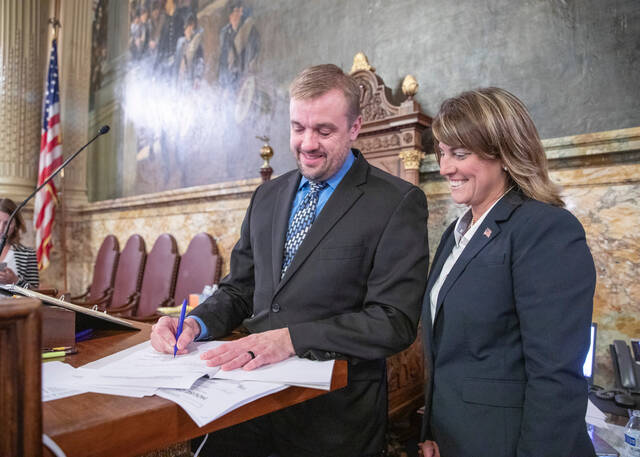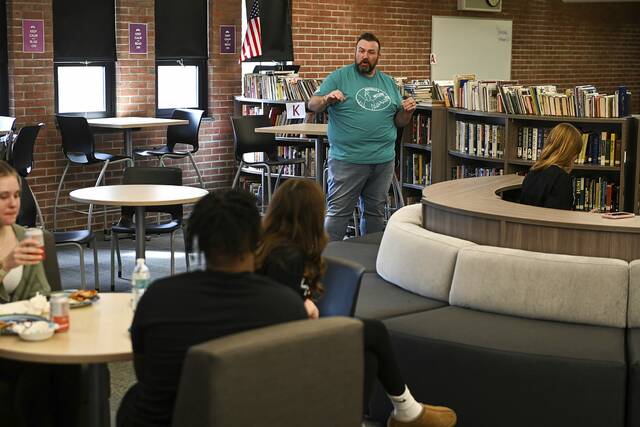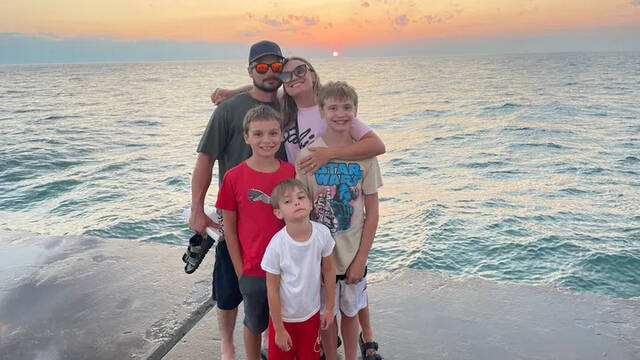People accused of sexually assaulting the elderly or others for whom they provide care will face the same charges as those who commit the crime against students, inmates and children in institutional settings.
A measure signed into law by Gov. Tom Wolf on Monday was sponsored by state Rep. Carrie Lewis DelRosso, R-Oakmont.
“During the pandemic and while knocking on doors, I recognized that these vulnerable populations, who are economically disadvantaged, didn’t have a voice,” DelRosso said.
“This would add further protections to that vulnerable population. I saw things happening in my district, and I thought we really needed to step up our game on this in the judicial system. I’m a proud advocate for these citizens.”
Before the law was enacted, the only people who faced a charge of institutional sexual assault were those working with students, inmates and dependent children in a professional setting.
This new offense would be triggered when a caretaker is accused of indecent contact, including engaging in sexual intercourse, with a person who receives care in or from a facility, according to the lawmaker.
Consensual sexual relations between spouses or other intimate partners for whom they provide care remains legal.
Attorney Rob Peirce, whose Pittsburgh law firm specializes in cases involving abuse of the elderly, said the law helps protect a population that often is overlooked.
“Not just in Pennsylvania, but throughout the United States, the elderly population is often forgotten,” Peirce said. “And, in some sense, that is understandable because they tend to be in a medical facility or a home and are infrequently visited by relatives or loved ones.
“But their living arrangement doesn’t mean they are free from the crimes committed against people as a whole.”
Peirce said legislation to protect vulnerable people often focuses on children or another group but not the elderly.
“Oftentimes, the elderly are not considered by these broad pieces of legislation designed to protect vulnerable people,” he said. “So this new law appears to cover the gap that exists.”
Pierce said sex crimes against care-dependent people are treated harshly because the victims are vulnerable and the perpetrator has power over them.
In many cases, the victims also cannot escape from the person who is abusing them because they are unable to leave a facility.
“Sometimes, they can’t even speak, so they are not even able to communicate what is being done to them,” Peirce said.
A person convicted under the subsection of institutional sexual assault will be charged with a third-degree felony, which is punishable by up to seven years in prison, a fine of up to $15,000 or both.
People convicted of institutional sexual assault also might be required to register on the state’s Megan’s Law sexual offender list.
The new law covers nursing homes, assisted-living facilities, private-care residences, adult daily living centers and other institutions that provide care.
The measure applies to caretakers, which includes the owner, operator, manager or employee of a facility, according to DelRosso, who is on the state House’s Aging & Older Adult Services Committee.
“This law will protect care-dependent people and adequately punish those who use their position of power and authority to sexually exploit them,” she said. “It is imperative that the commonwealth protect those who cannot protect themselves.”
Lisa J. Perry, executive director of Pittsburgh Action Against Rape, said the law is a step in the right direction.
“We know that sexual offenders are often drawn to our most vulnerable populations,” she said. “And, more so, we know that sexual violence does not discriminate. Perpetrators seek out victims who they perceive as easy to manipulate or overpower and that are unlikely to report the assault. These victims are often care-dependent persons.”
Perry said the new legislation is part of a solution for protecting the state’s most vulnerable residents.
“Prioritizing the safety and well-being of care-dependent persons and seniors is key,”she said. “We also know that rape and sexual abuse are preventable through education, training and communication.
“We must continue to talk about these issues and work on long-term education and prevention as a way to protect this population.”
Mike Manko, a spokesman for Allegheny County District Attorney Stephen A. Zappala Jr., said the DA supports the effort.
“District Attorney Zappala has always been a vigorous advocate for the protection of our older population, so this latest addition to the statute will add to those protections,” Manko said.
“The DA has also used this office to monitor the treatment and standard of care that is given at personal care homes and nursing homes, and it may be time for the Legislature and individual communities to pay more attention to those facilities as our population continues to age.”








